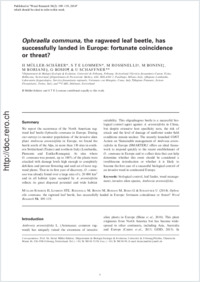Ophraella communa, the ragweed leaf beetle, has successfully landed in Europe: fortunate coincidence or threat?
- Müller-Schärer, Heinz Département de Biologie Ecologie Evolution, Université de Fribourg, Switzerland
- Lommen, Suzanne T. E. Département de Biologie Ecologie Evolution, Université de Fribourg, Switzerland
- Rossinelli, M. Servizio fitosanitario Canton Ticino, Bellinzona, Switzerland
- Bonini, M. Dipartimento di Prevenzione Medica, Milano, Italy
- Boriani, M. Regione Lombardia, Laboratorio fitopatologico, Servizio fitosanitario regionale, Vertemate con Minoprio, Como, Italy
- Bosio, G. Regione Piemonte, Settore Fitosanitario, Torino, Italy
- Schaffner, Urs CABI, Delémont, Switzerland
-
01.04.2014
Published in:
- Weed Research. - 2014, vol. 54, no. 2, p. 109–119
English
We report the occurrence of the North American ragweed leaf beetle Ophraella communa in Europe. During our surveys to monitor populations of the invasive alien plant Ambrosia artemisiifolia in Europe, we found the beetle south of the Alps, in more than 130 sites in southern Switzerland (Ticino) and northern Italy (Lombardia, Piemonte and Emilia-Romagna). At sites where O. communa was present, up to 100% of the plants were attacked with damage levels high enough to completely defoliate and prevent flowering and seed set of most ragweed plants. That in its first year of discovery, O. communa was already found over a large area of c. 20 000 km2 and in all habitat types occupied by A. artemisiifolia reflects its great dispersal potential and wide habitat suitability. This oligophagous beetle is a successful biological control agent against A. artemisiifolia in China, but despite extensive host specificity tests, the risk of attack and the level of damage of sunflower under field conditions remain unclear. The recently launched COST Action on ‘Sustainable management of Ambrosia artemisiifolia in Europe (SMARTER)’ offers an ideal framework to respond quickly to the recent establishment of O. communa in Europe and to collect data that can help determine whether this event should be considered a troublesome introduction or whether it is likely to become the first case of a successful biological control of an invasive weed in continental Europe.
- Faculty
- Faculté des sciences et de médecine
- Department
- Département de Biologie
- Language
-
- English
- Classification
- Biological sciences
- License
-
License undefined
- Identifiers
-
- RERO DOC 209915
- DOI 10.1111/wre.12072
- Persistent URL
- https://folia.unifr.ch/unifr/documents/303661
Statistics
Document views: 125
File downloads:
- pdf: 865
